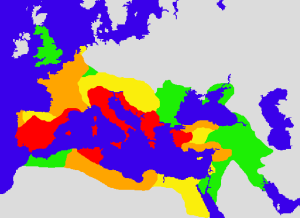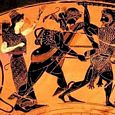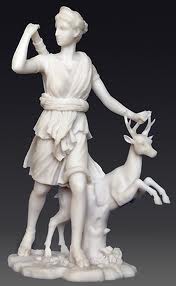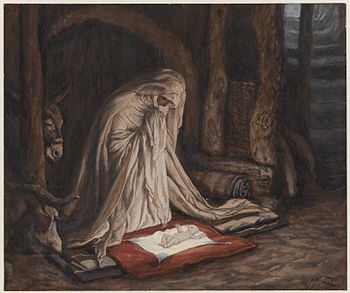1.1. Considered as a danger
1.1.1. Position and power
The founder of the Christianity, Jesus from Nazareth, the Christ, prayed that between his followers could exist unity (John 17:21), and the apostles really tried to keep the unity of the Christian municipality (1 Corinthians 1:10; Jude 17-19), but already in the first century false teachings entered Christianity.
The fact, that the Christians were a closely united body, fresh, vigorous, hopeful, and daily increasing, while the heathen were for the most part a loose aggregation, daily diminishing, made the true prospective strength of the church much greater. But they remained strongly surrounded by all kinds of several pagan belief forms and popular activities which could be sometimes very tempting.
With the years going by, the Christians came to stand for all sorts of trials and persecution. As the first disciples they draw consolation and encouragement from their meetings. Consequently the apostle[1] Paul wrote to the Hebrews 10:24, 25: “let us keep paying attention to one another, in order to spur each other on to love and good deeds, not forsaking the assembling of ourselves together, as the manner of some is; but exhorting one another: and so much the more, as you see the day approaching.” Those words are much more than a command to come and remain together. They provide a through God inspired standard that counts for all Christian assemblies— and actually for each occasion that Christians come together.
The apostles had been aware that dispute in the belief could lead to vehemently, discord and even enmity. (Acts of the Apostles 23:7-10) The apostles and early inspired men of the first century defended the Christian faith in two ways: verbally (Acts 22.1, Philippians 1.7, 16, 2 Timotheüs 4.16) and by means of literature (1 Corinthians 9.3).
Already in their time the apostles had to warn the followers of Christ for false teachers and wrong teachings which slowly entered the faith already n the first century.

Conversion of Saul (Paul) on the road to Damascus
The apostle John refutes misconceptions of how to live godly in the face of the docetic-gnostic teachers infiltrating the church (1 John 2.1). “For many deceivers have entered into the world, who confess not that Yahshua the Messiah has come in the flesh. This is a deceiver and an antichrist.” (2 John 1:7 KJBPNV) “Because a number of false teachers have gone out into the world, who do not give witness that Jesus Christ came in the flesh. Such a one is a false teacher and Antichrist.” (2 John 1:7 BBE)
Peter writes: “But there were false prophets also among the people, even as there shall be false teachers among you, who secretly shall bring in damnable heresies, even denying the Lord that bought them, and bring upon themselves swift destruction.” (2 Peter 2:1 KJBPNV) “Especially those who follow their old natures in lust for filth and who despise authority. Presumptuous and self-willed, these false teachers do not tremble at insulting angelic beings;” (2 Peter 2:10 CJB)
No one of genuine concern wants to be wrong on what the Bible teaches. Therefore we must be cautious and ready to see all the biblical evidence as slowly or quickly as it is analyzed. In principle, it is what we find in Paul’s instruction to the Thessalonians: “Quench not the Spirit. Despise not prophesying. Prove all things; hold fast that which is good. Abstain from all appearance of evil.” (1 Thessalonians 5:19-22 KJBPNV)
Abiding in the words of the Gospel (John 8.31-32) we must be patient, hoping to receive the gift of the Holy Spirit, and let the scriptural facts reveal themselves on their own terms. Some early Christians were lacking that patience and found it not pleasant to give up their old customs. They then became attracted by those who found that it did not matter so much to love so strictly.
As long as the apostles lived, they protected the municipality. The history shows that the early Christians were not concerned by the political matters of the Roman Realm and that they had no prominent class of clergymen. Instead they were all diligent proclaimers of Gods kingdom. To the end of the first century, they had given testimony in all parts of the Roman Realm and had made disciples in Asia, Europe and North-Africa. (Colossians 1:23). These performances in the preaching meant however not that it was not longer necessarily to remain spiritually watchful. Jesus predicted coming lay yet far in the future.
Sects had to be avoided, since they belonged to the works of the meat (Galatians 5:19-21). Christians were admonished to promote no sects neither to let them self bring on a wrong track by false teachers (Acts of the Apostles 20:28; 2 Timothy 2:17, 18; 2 Peter 2:1). In his letter to Titus the apostle Paul commanded that a man who after a first and a second serious admonition continued to promote a sect, had to become rejected, what apparently meant that he must become rejected from the municipality (Titus 3:10). Those who refused to become involved by the causing of disunion within the municipality or by the supporting of a particular party, would distinct themselves through their faithful walk and give a token to own Gods approval. This was what Paul apparently meant when he said to the Corinthians: “For there must be also factions or sects among you, that they that are approved may be made manifest among you.” (1 Corinthians 11:19).
The Christians kept high principles of morality and probity, and with fiery diligence made the message of hope known. Thousands left Judaism and accepted Christianity (Acts 2:41; 4:4; 6:7). In the eyes of the Jewish religious leaders Jesus’ followers were unfaithful or apostate. (Acts of the Apostles 13:45.) These furious leaders were of opinion that Christianity annulled their traditions. Yes, it denied even the view that they had on heathen! From 36 C. T. a heathens could become Christian and believe and hope in the same privileges as Jewish Christians. (Acts 10:34, 35).
Because of their high morality beginnings and the holding fast on to their belief conviction on more than one issue superior the Christians in the Roman world became not loved. Their separateness of the world (Johannes 15:19) triggered aversion. They did not take up political office and refused military service. As consequence of this they “became proposed as men that were dead for the world, and useless for all matters of life”, according to the historian August Neander. Not being part of the world, meant also to avoid the godless ways of the Roman world. “The small Christian-communities disturbed the pleasure making pagan world with their piety and decency”, explains the historian Will Durant (1 Petrus 4:3, 4). By pursuing and bringing the Christians before court perhaps the Romans tried to bring well the tormenting voice of the conscience till silence.

Extent of the Roman Empire from 133 BCT unto 117 CT
The first-century Christians preached the good news of God’s kingdom with unshakable diligence (Matthew 24:14). About 60 C. T. Paul could say that the good news’ was preached in whole the creation that under the heaven is ‘(Colossians 1:23). At the end of the first century, Jesus’ followers had made supporters and disciples in the whole Roman Realm — in Asia, Europe and Africa! Even some members of “the house of Caesar” became Christians (Philippians 4:22). This diligent preaching woke resentment. Neander says:’ Christianity steadily progressed under lay men from all forms of population and threatened to bring the state religion to fall.’ You can imagine how considerably important it really could be to let men infiltrate to let bring them on other thoughts.
Jesus’ followers offered Jehovah exclusive devotion (Matthew 4:8-10). Perhaps this aspect of their adoration brought them more than what else in conflict with Rome. The Romans were tolerant to other religions, as long as their supporters also participated at the emperor adoration. The early Christians normally could not participate at such adoration. They looked at themselves as people, that were due account at an authority that was higher, than that of the Roman state, namely Jehovah God (Acts 5:29). As a consequence of this a Christian became, though he was further in such a way in all respects such an exemplary citizen, considered as an enemy of the state.
There was yet another reason, about which faithful Christians in the Roman world became “objects of hatred”: Common backbiting over them was believed stylus, accusations, for which the Jewish religious leaders were in not small extent responsible, (Acts 17:5-8). About 60 or 61 C. T., when Paul waited in Rome for his trial by emperor Nero, prominent Jews said over Christians: “Really, what concerns this sect, it is us known that she experiences everywhere arguments” (Acts 28:22). Nero would certainly have heard defamatory stories over them. In 64 C. T. he chose, when he was held responsible for the fire that Rome afflicted, according to reports to use the already everywhere slandered Christians as scapegoats. This appears to have brought on a wave of violent persecution that had as target to exterminate the Christians.[2]
The false accusations that were brought in against the Christians were often based on a mixture of straight lies and a twist of their belief views. Because they were monotheistic and not adored the emperors, they were labelled as atheists. Because some non-Christian family members revolted with their Christian family members, they became accused to disrupt their family (Matthew 10:21). They were constituted for cannibals, an accusation that was based according to some sources on a twisting of the words that Jesus had uttered during the Last Supper. (Matthew 26:26-28).
Towards the end of Nero’s reign the Christians were required, under the heaviest penalties, even that of death, to offer sacrifices to the emperor and to the heathen gods. After the death of Nero the persecution ceased, and the followers of Jesus enjoyed comparative peace until the reign of Domitian, an emperor little behind Nero in wickedness.
The dispersion of the Jews, and the total destruction of their city and temple in 70 C.T., are the next events of consideration in the remainder of the first century. The numbers that perished under Vespasian in the country, and under Titus in the city, from A.D. 67-70, by famine, internal factions, and the Roman sword, were one million three hundred and fifty thousand four hundred and sixty, besides one hundred thousand sold into slavery.[3]
“Domitian,” says Eusebius, the father of ecclesiastical history, “having exercised his cruelty against many, and unjustly slain no small number of noble and illustrious men at Rome, and having, without cause, punished vast numbers of honourable men with exile and the confiscation of their property, at length established himself as the successor of Nero in his hatred and hostility to God.”[4] He also followed Nero in deifying himself. He commanded his own statue to be worshipped as a god, revived the law of treason, and surrounded himself with spies and informers to bring a second persecution of the Christians.
Christianity, in spite of Roman emperors, and Roman prisons, and Roman executions, pursued its silent steady course. In little more than seventy years after the death of Christ, it had made such rapid progress in some places as to threaten the downfall of paganism.

Artemis Apollon Herakles
Christians got the hatred of pagan worshippers on their neck. As the making of small silver temples of the goddess Artemis was a profitable business in the old Ephesus. But when Paul preached over there, a considerable number Ephesians reacted positively to his preaching and turned for this purpose their back to the adoration of Artemis. Now their trade was threatened, caused the silver blacksmith a tumult (Acts 19:24-41). Something similar did happen after Christianity had expanded itself until Bithynia (now Northwest-Turkey). Not long after the Christian Greek Writings were finished, the ruler of Bithynia, Pliny the Younger, informed that pagan temples became left and the sale of feed for offering animals drastically collapsed. The Christians were blamed — and were prosecuted — because in their adoration there was no place for animal offerings and idols (Hebrew 10:1-9; 1 Johannes 5:21). It is clear that the spread of Christianity practiced influence on particular established interests connected with pagan adoration, and, those who as consequence of this lost as well trade as earnings, fumed about this.
By the progress of Christianity the temporal interests of a great number of persons were seriously affected. This was a fruitful and bitter source of persecution. The heathen temples became more and more deserted, the worship of the gods was neglected, and victims for sacrifices were rarely purchased. This naturally raised a popular cry against Christianity, such as the one at Ephesus: “This, our craft is in danger to be set at nought, and the temple of the great goddess Diana to be despised.”

Diana goddess of hunting
A countless throng of priests, image-makers, dealers, soothsayers, augurs, and artisans, found good livings in connection with the worship of so many deities. All these, seeing their craft in danger, rose up in united strength against the Christians, and sought by every means to arrest the progress of Christianity. The cunning priests and the artful soothsayers easily persuaded the vulgar, and the public mind in general, that all the calamities, wars, tempests, and diseases that afflicted mankind, were sent upon them by the angry gods, because the Christians who despised their authority were everywhere tolerated.[5] They invented and disseminated the vilest calumnies against everything Christian and laid many and grievous complaints against the Christians before the governors. This was especially so in the Asiatic provinces where Christianity was most prevalent.The First Christians naturally withdrew themselves from the pagans and became a separate and distinct people and held their meetings secretly. They could not but condemn and abhor polytheism, as utterly opposed to the one living and true God, and to the gospel of His Son Jesus Christ; this gave the Romans the idea that Christians were unfriendly to the human race, seeing they condemned all religions but their own. Hence they were called “Atheists,” because they did not believe in the heathen deities, and derided the heathen worship.[6] But that confinement of that pagan population seemed not always even easy.
[1] “apostle” signifies one “sent forth.”
[2] In the month of July A.D. 64 a great fire broke out in the Circus, which continued to spread until it laid in ruins all the ancient grandeur of the imperial city. The flames extended with great rapidity, and Rome being a city of long narrow streets, and of hills and valleys, the fire gathered force from the winds, and soon became a general conflagration. In a short time the whole city seemed wrapped in one sheet of burning flame.
[3] Dean Milman’s History of the Jews, vol. 2, book 16, page 380
[4] Roman History, Encyclopedia Britannica, vol. 19, page 406
[5] Mosheim’s Ecclesiastical History, vol. 1, page 67. Cave’s Primitive Christianity; early chapters
[6] Christian worship, in true simplicity, without the aid of temples and priests, rites and ceremonies, is not much better understood now by professing Christendom than it was then by pagan Rome. Still it is true Today a lot of name Christians want also to see priests in special clothes and services with offerrings, incense and symbols in temples or special church buildings. Instead of knowing that “God is a Spirit, and they that worship Him must worship Him in spirit and in truth.” (John 4:24)
+
Persecution of Christians under Nero > Bible-history Nero
The Institutions behind the Terms in the 1st Century













 Bijbelvorsers Webs
Bijbelvorsers Webs Belgische Vrije Christadelphians / Belgian Free Christadelphians – Old Google Main Website
Belgische Vrije Christadelphians / Belgian Free Christadelphians – Old Google Main Website Christadelphian Ecclesia
Christadelphian Ecclesia Hoop tot Leven – Redding in Christus
Hoop tot Leven – Redding in Christus
Recent Comments